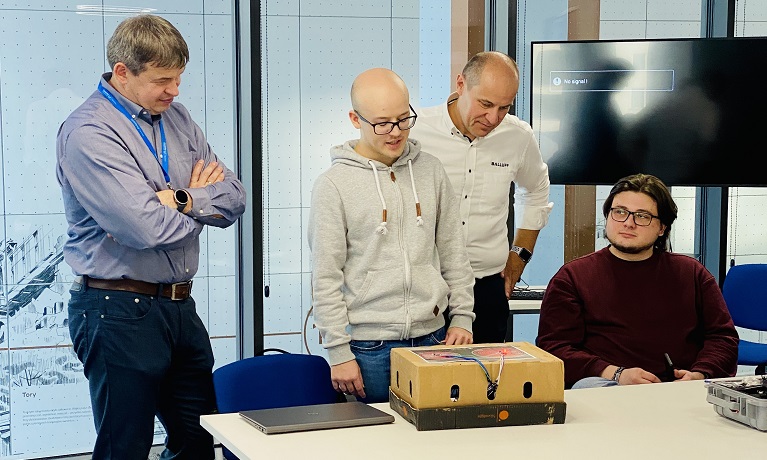Search
Cyber Security BSc (Hons)

As a result of the continuing digital revolution, computer systems are involved in just about every aspect of modern life.
Course features
Year of entry
Location
Coventry University Wrocław (Poland)
Study mode
Full-time
Sandwich
Duration
3 years full-time
4 years sandwich
Course code
CUPU047
Start date
January 2026
March 2026
May 2026
June 2026
Course overview
As the number of mobile users, digital applications, and data networks increase, so has the number of potential risks and threats, resulting in the need for talented professionals to secure and protect systems and data.
Our Cyber Security BSc (Hons) course is designed to produce high quality graduates who can contribute effectively in one of the highest growing sectors globally.
The course offers real-life tools and challenges, giving you the opportunity to become an independent learner through practical projects and advanced teaching methods.
Why you should study this course
At Coventry University Wrocław, we aim to offer a career-focused experience to our students, one that is traditionally academic but is also designed to help you progress in your future career. Our offering is flexible and designed to fit around your life, allowing you to benefit from a modern, forward-thinking higher education institution, reinforced by the quality and reputation of Coventry University. We are dedicated to making higher education accessible and enjoyable for as many people as possible, so we only to cover one module at a time, allowing you to study each topic before moving onto the next.
- Test and learn in our Cyber Lab - a dedicated space designed to give you - our computing and cyber course students - a practical learning experience for conducting research, testing and experimentation related to cyber security.3
- We are dedicated to making higher education accessible and enjoyable to everyone.
- Our courses cover one module at a time, allowing you to study each topic before moving on to the next.
- We aim to provide career-focused courses, wherever possible, coupled with placement opportunities to help prepare you for the world of work.1
- We offer multiple start dates each year, meaning we're ready to start preparing you for your future, when you are.
Official Course Partner
 GlobalLogic, a leader in digital engineering services and part of the Hitachi group, collaborates with Coventry University to provide real-world insight from the industry. Through internships, training, and live projects, GlobalLogic provides hands-on experience with cutting-edge technologies and real-world challenges.1
GlobalLogic, a leader in digital engineering services and part of the Hitachi group, collaborates with Coventry University to provide real-world insight from the industry. Through internships, training, and live projects, GlobalLogic provides hands-on experience with cutting-edge technologies and real-world challenges.1
Collaborating with Coventry University, we help students develop in-demand skills for industries like automotive, healthcare, and technology, preparing them to thrive in the digital world.
I chose my Cyber Security course because it covers a broad range of topics connected with the security of IT and I would like to work in computer forensics or IT security. The possibility to learn in English can be beneficial to my future career.
Weronika Litwin, Cyber Security BSc (Hons), graduated in 2023

What you'll study
This course examines the principles and threats that underpin computer systems, networks and the software development process. Throughout the programme, you will aim to become competent and confident in a range of prevalent topics, such as operating systems, networking, information security, Python programming language, penetration testing, ethical hacking and more.
We regularly review our course content, to make it relevant and current for the benefit of our students. For these reasons, course modules may be updated.
Artificial intelligence device prototype
A device using artificial intelligence to recognise faces and open house doors is among prototypes designed by students at Coventry University Wrocław.
Read the story
How you'll learn
This course is available as a full-time three-year or optional four-year sandwich course, the latter incorporating a work placement or study year in a related field1.
Our teaching methods are varied, offering a number of teaching styles to suit the needs of our students, so in addition to lectures, we also utilise a blended learning approach, including online aspects, workshops and group work. Additional support is available via email and our online learning platform, which is currently Aula.
Progression through the modules develops knowledge and skills, including communication (written and oral), study skills, research methods, project management, presentation and career development. We will also encourage you to consider your employability and/or entrepreneurial development.
Unlike traditional institutions, there are no end-of-year exams. Instead, learning is assessed through coursework and phase tests, which is more reflective of our learning model.
Teaching contact hours
As a full-time undergraduate student, you will study modules totalling 120 credits each academic year. A typical 20 credit module requires a total of 200 hours study. This is made up of teaching contact hours, guided and independent study.
Teaching hours:
Teaching hours vary each semester, year of study and due to module selection. During your first year you can expect 15-18 teaching hours each week. You will also have the option to attend optional sessions including time with a progress coach or to meet with staff for advice and feedback. As you progress through your studies, teaching hours may reduce.
Guided and independent study:
Throughout your studies, you will be expected to spend time in guided and independent study to make up the required study hours per module. You’ll be digging deeper into topics, review what you’ve learned and complete assignments. This can be completed around your personal commitments. As you progress through your studies, you’ll spend more time in independent study.
Online learning:
As an innovative university, we use different teaching methods including online tools and emerging technologies. So, some of your teaching hours and assessments may be delivered online.
Assessment
This course will be assessed using a variety of methods which will vary depending upon the module. The assessment methods may include:
- phase tests
- essays
- group work
- presentations
- reports
- projects
- coursework
- individual assignments.
The Coventry University Group assessment strategy ensures that our courses are fairly assessed and allows us to monitor student progression towards achieving the intended learning outcomes.
Entry requirements
Typical entry requirements:
Fees and funding
| Student | Full-time | Part-time |
|---|---|---|
| EU | 27,500 zł (EU) per year | Not available |
| International | 46,000 zł (non-EU) per year | Not available |
Coventry University Wroclaw will review tuition fees each year. Coventry University Wroclaw may increase fees for each subsequent year of study but such increases will be no more than 5% above inflation. Please note that the calculation of inflation is based on the information on price indices of consumer goods and services published by the President of the Statistics Poland on the website www.stat.gov.pl for the quarter preceding the fees’ valorisation. Students who are not satisfied with the changes will be offered the opportunity to withdraw.
If you choose to study a course with a placement/sandwich year, you will need to pay a tuition fee2 of 2000 zł to cover your academic support.
For advice and guidance on tuition fees and student loans visit our Undergraduate Finance page and see the University’s Tuition Fee and Refund Terms and Conditions.
We offer a range of scholarships to students. For more information, visit our Scholarships page.
Tuition fees cover the cost of your teaching, assessments, facilities and support services. There may be additional costs not covered by this fee such as accommodation and living costs, recommended reading books, stationery, printing and re-assessments should you need them.
The following are additional costs not included in the tuition fees2:
- any optional overseas field trips or visits: zł2011+ per trip.
- any costs associated with securing, attending or completing a placement (whether in Poland, the UK or abroad)
Facilities
Located over two floors of a state-of-the-art building, campus supports the needs of students and provides facilities to complement the current courses being taught.
- purpose-built IT suites
- breakout social spaces
- a library that includes loan laptops and 1-2-1 support
- open access computers with internet and printing access
- student support and customer services
Facilities are subject to availability. Access to some facilities (including some teaching and learning spaces) may vary from those advertised and/or may have reduced availability or restrictions where the university is following public authority guidance, decisions or orders.
Careers and opportunities
The Cyber Security BSc course at Coventry University Wrocław provides students with a strong foundation in cyber security, industry-relevant skills, work-based learning, and career guidance.
An important vocation in the modern digital age, Cyber Security professionals work with creativity and analytical thinking to understand how systems can be broken, protected and used.
A career in cyber security is challenging, dynamic and highly transferable, meaning graduates may have the opportunity to work internationally throughout their careers as there is a recognised global demand for trained specialists.
Cyber security is a rapidly growing market, with plenty of scope to develop a very lucrative career. Graduates from this course can enter a number of specialisms, such as a Cyber Security Consultancy, Software Developer/Programming, Cyber-Crime Investigation or Digital Forensics Analysis.



